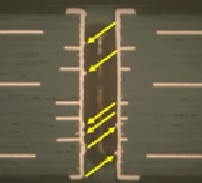Irregular Plating (Plating Folds/ Nodules)
Defect Description
Irregular plating results in folds/nodules that increases local stress concentrations and crack initiation upon the exposure to environmental stresses such as temperature cycling and vibration
Defect Formation Process(s)
Rough drilling can be a result of poor laminate material, worn drill bits, or an out-of-control drilling process
Improper hole preparation can occur due to excessive removal of epoxy resin caused by an incomplete cure of the resin system or due to a preparation process, like desmear or etchback, that is not optimized [1].
|
List of Tests to Precipitate this Defect |
Failure Acceleration |
Likelihood to Precipitate this Defect (condition) |
Failure Mechanism(s) |
|
Thermal Shock |
• Cyclic thermal mechanical stress accelerates crack initiation or crack growth at the folds/ nodules where local stress concentration is high • Thermal mechanical stress causes fracture of the copper plating at the folds/nodules where local stress concentration is high |
✔ |
Thermal Fatigue Thermal Mechanical Overstress |
|
Random Vibration (RS/ED) |
• Random Vibration accelerates crack initiation or crack growth at the folds/ nodules where local stress concentration is high • Vibration causes fracture of the copper plating at the folds/nodules where local stress concentration is high |
✔/✇ |
Mechanical Fatigue Mechanical Overstress |
|
Combined Environment |
• Combination of Thermal Shock and Random Vibration |
✔ |
Combination of Thermal Shock and Random Vibration |
|
Bend Test |
• Bending can cause fracture of the copper plating at the folds/ nodules where local stress concentration is high |
✇ (Defect at a location with significant strain due to bending) |
Mechanical Overstress |
 [3]
[3]
References
[1] Tulkoff C., Hillman C., “Reliable plated through via design and fabrication.” DFR Solutions
Permission for pictures
[3] Tukloff C., Caswell G., Hillman C., “ Best Practices for Improving the PCB Supply Chain: Performing the Process Audit”, DFR Solutions
Top